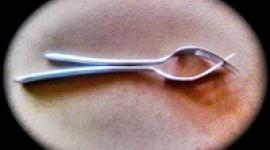Lots of Food. No Sex. Time for Rehab
I'M AN ADDICT. My drug of choice isn't heroin, crystal meth, or crack cocaine, but it's just as destructive and impossible to kick cold turkey. I'm strung out on food.
I'm 35 years old, stand 5'10" tall, and weigh 300 pounds. I am obese. Over the years, I've tried every diet to hit The New York Times best-seller list, yo-yoing all over the scale, from a rotund 315 pounds down to a burly 245, and rebounding back to a plump 300. Nothing seems to work, and inevitably the jones to graze always gets the best of me.
Every evening, I eat myself into a coma, then crash in front of the TV or down enough Jack Daniels and ginger ale to dull my senses. My edibles-as-drugs problem is compounded by the fact that I live in New York City, home of the world's best food fixes--thick, juicy steaks at Smith & Wollensky's, the world's greatest pizza at John's, dry-rub baby-back ribs at Virgil's BBQ, and the tastiest ethnic restaurants. But, let's face it, even if I lived in a gastronomic backwater, I'd still do the same thing.
This is what it's like being a walking fat body: I have to shop at big-and-tall stores, paying top dollar because nothing in the pages of this or any magazine fits me off the rack. I need a seat-belt extender on airplanes. And I have a hard time stuffing myself into the cheap seats at Knicks games.
Even more disturbing: My weight is harshing my sex life. Performance isn't the issue--it's just getting in the game. Usually hesitant to approach women, I often rely on friends to make the opening move. I shrug it off to shyness, but I know the real reason: I'm afraid to have relationships with women because I don't find myself attractive, so why, I figure, should they?
I'm not looking for your pity. Fuck that. I'm comfortable in my skin. While the looks and sneers sting, they usually come from superficial assholes I wouldn't want to know anyway. But the health implications do terrify me: limited mobility, diabetes, liver damage, gout (from which I already suffer), heart disease, and stroke. All point to an early grave.
Then came the assignment: Spend two weeks at the Duke University Diet & Fitness Center (DFC) in Durham, N.C., and write about it for Men's Fitness. I felt like I had just won the lottery.
Orientation: May 9
Established in 1969, the DFC is one of the country's oldest weight-management centers. From the outside, this one-story brick building looks like my old grammar school. But inside, it's more like a clinic, with its large gym, 25-meter pool, and many doctors' offices. Its program teaches health and wellness through diet, exercise, and behavior modification--voluntary rehab for the weight-challenged.
Looking around orientation, I size up my hefty comrades. They, too, seem to think, "What the hell did I get myself into?" When the time comes for introductions, this might as well be A.A. "Hi, my name is Chuck, and I'm obese."
I was sure the other attendees would wallow in self-pity: "I ate myself into a blob because life dealt me crappy cards." Boo-fucking-hoo. But in reality, I get a positive vibe from my fellow food fiends. Most are fired up for the coming battle and unafraid to share experiences. I admire that.
Day One: May 10
Enrolling in the DFC is like earning a master's degree in healthy living. The most repeated lesson: The keys to fitness are time management and organization. But to me, the idea of planning out meals and exercise is non-spontaneous and unappealing--I've always flown by the seat of my extra-large pants. This will be the hardest adjustment.
Medical, nutritional, physical, and psychological evaluations begin today. I'm poked and prodded by anyone in a lab coat. The goal of this interrogation, explains DFC director Dr. Howard Eisenson, is to produce a clinical profile to ensure I'm healthy enough to go through the program. It's humiliating--I can't go more than seven minutes on the treadmill during my stress test. My lab results show no abnormalities, but I still feel like a big whale.
Day Two: May 11
Today we focus on good nutrition. You need a comprehensive understanding of what healthy comestibles are and how they affect your body. Indeed, as Funkadelic once put it, "Free your mind and your ass will follow."
During my physical assessment, I realize exercise doesn't have to be monotonous and shouldn't be painful. The slogan "No pain, no gain" is bull-shit. "If you're hurt," cautions Gerald Endress, DFC's fitness manager, "you won't get off the couch. Your success in this program and in life depends on getting out and doing some physical activity."
As the day ends, one thing is clear: Losing weight and getting healthy will be a long process. I didn't wake up one morning with this huge gut. It took years of lethargy to eat and drink myself into this shape. I simply let my consumption spiral out of control in college--and never stopped.
Day Three: May 12
This morning, I attend a meditation class to learn how to "communicate" with my body and make peace with my inner-hunger demon. Sounds ludicrous, but I am actually able to converse with my pained parts--specifically, my sore back muscles, pounding head, and grumbling stomach--simply by concentrating and asking each what it wants. By recognizing there is a problem, my body feels better. This type of touchy-feely crap normally doesn't fly with me. This experience, however, is enlightening. (It still freaks me out, though.)
Next up, I meet with nutrition manager Elisabetta Politi, who corroborates my worst fear: I eat too much shit. Who would've thought fast food, Chinese delivery, and pizza aren't good for you? "Proper eating is all common sense" she says. "Stay away from heavy fats, count calories, eat less processed sugar, limit your sodium intake, and you'll be fine."
Uh, easy for her to say. In my world, eating isn't just a means of sustenance--it's a social event. Food should be enjoyed, even celebrated. "You can still eat out in restaurants with friends," she assures me. "Just choose the right things off the menu and manage your portions. You'll learn."
Behavior modification, then, is the gateway to shedding pounds. Of course, when I was young, my parents practically taught me the opposite--that leaving food on my plate was a waste of money. Or they'd say, "Clean your plate: Kids are going hungry all over the world." This was clearly a mistake of good intentions, but it's not their fault I have self-control issues. They were looking out for my best interests. Now I'm an adult. I have to learn to leave more food on my plate.
Day Four: May 13
Let's talk alternative exercise--yoga, for instance. I thought that was a chicks-ercise. But after road-testing these simple stretching movements and correct breathing and relaxation techniques, I'm invigorated, my focus and mental acuity enhanced. Also in my new routine are water aerobics, a daily one-hour walk, and, three times a week, a half-mile swim and weight workout. This healthy-living "crap" might just work.
Later, my group gathers to interpret our lab results. Mine are not good. Suddenly, my newfound enthusiasm takes one to the gut--I have quantitative evidence that I'm on the road to an early grave.
My glucose is high. (I'm, like, one candy bar away from diabetes.) My cholesterol's good/bad ratio is bad/bad. (It's 6.2--it should be under 5.0.) And my triglycerides (fat stored in the bloodstream) are double the norm. Plus, I display four of the five indicators for increased risk of heart disease. (My father, while not overweight, died of a heart attack at age 59.)
Graded on a curve, my results aren't so horrible: A couple of people in the group learn they have serious medical conditions needing immediate attention. Others' cholesterol levels are as high as the population of Hong Kong. Still, this doesn't comfort me. After all, I'm on what is derisively called a "fat farm." And I'm not vying for the DFC's coveted Most Weight Lost prize. I'm fighting my own demons.
Day Five: May 14
What a turnaround--I'm on top of the world this morning! I've lost nearly eight pounds.
Portion control helped get me to this point. They're not starving me, just giving me smaller amounts of healthier foods. Instead of eating lots of starchy fillers--potatoes, rice, etc.--my plate is filled with fresh vegetables, salad, and fruits. Food preparation is also key: limiting oil, mayonnaise, and fatty condiments, and grilling or steaming foods, not frying.
The result: I feel better, I have more stamina, and I'm thinking more clearly--after just five days!
I'm also really digging Pilates. The stretching and strength-enhancing movements have loosened my limbs, improved my flexibility, and tightened my stomach muscles. (It's even better in a coed class: Some of the positions are very sexually suggestive.)
Though I'm enjoying my time in this sheltered environment, I wonder how I'm going to translate my experiences here to the real world. That's where today's Planning Your Restaurant Experience class comes in handy. It teaches us how to order off the menu by asking the waiter about ingredients and preparation. And we're reminded about portion control, a difficult hurdle for me because I've always enjoyed the supersize, more-for-my-money mentality.
WEEK 2
Day Eight: May 17
Eating healthier starts with buying healthier foods. This afternoon, nutritionist Monette Williams takes me and another patient, Warren, on a tour of a Kroger's supermarket. Instead of grabbing items off the shelves impulsively (as I would at home), we stroll the aisles and carefully read nutrition labels. The foods Warren and I normally buy are loaded with sodium, processed sugars, and wasted calories. Now we're empowered, knowing which foods to reject and which to embrace.
Last Day: May 22
I'm a convert. Two weeks ago, I would never have predicted such a change in lifestyle and attitude. Now I know that pessimism is what killed my other healthy-living attempts.
Still, going home is a little scary. I'm worried about falling back into gluttony. But I've resolved to join a gym, mapped out my exercise regimen, and worked out some menus. I've lost 12.5 pounds and more than halved my triglycerides to normal. Last Thursday, I was ready to buy burial insurance--now I'm looking into mountain bikes.
One Month Later
The real world isn't as scary as I predicted. I'm still losing weight (I'm down 24 pounds), and I exercise daily. Every morning I stretch, then walk an hour. I lift twice a week, play racquetball, and do yoga and Pilates. And I can't imagine powering down Ben & Jerry's Cookie Dough on the couch.
The DFC taught me we all need to get off our fat asses, exercise, and eat healthier foods. More important, I learned I have an amazing support system. My family and friends are here for me, and I can call them anytime.
I'm still hardly slim--I strive to be 200 pounds by May. At that point, I'll be a changed man. Well, a thinner, more fit one, anyway.
THE WAR ON FAT
SUCK IT IN
According to Harvard research, Body Mass Index (BMI) measurements may incorrectly classify some men as being over-weight when they are, in fact, in very good shape. Why? Muscle weighs more than fat, so a 250-pound weightlifter and a similar-sized office drone can often have the same BMI. That's why--if you're trying to get fit--it's better to focus on your waist circumference, rather than your actual poundage. You can mark progress with a tape measure, or simply grab a pair of jeans you can't fit into anymore and try them on once a week. Even if your weight and BMI aren't changing with your workout, the jeans should gradually start to fit you better--a sure sign your program is working.
CHUBBY HUBBY
It's not just your imagination that having a wife weighs you down. Most married men are thinner pre-vow than post--as those wedding pictures (and cruel friends) are sure to point out. One theory suggests that not being on the lookout for a partner allows you to get comfortable (i.e., fat). On the flip side, marital problems also lead to stress-eating and the inevitable weight gain that follows. But before you swear yourself to the single life or call that divorce attorney, there is one more twist to the equation. You may be thinner when you're single, but studies show that married guys live significantly longer than bachelors. The choice is yours, cowboy.
APA Reference
Staff, H.
(2025, December 16). Lots of Food. No Sex. Time for Rehab, HealthyPlace. Retrieved
on 2026, March 5 from https://www.healthyplace.com/sex/body-image/lots-of-food-no-sex-time-for-rehab


